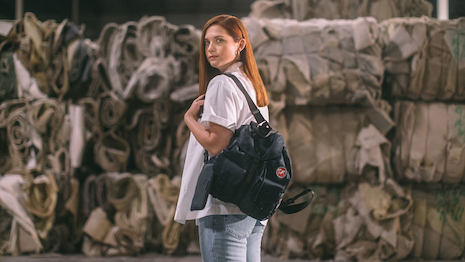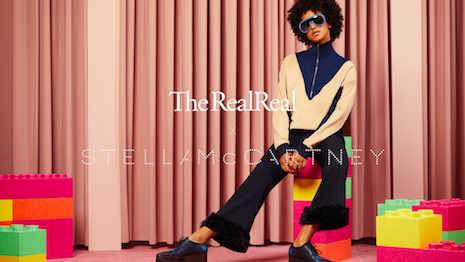- About
- Subscribe Now
- New York,
January 21, 2020

 Actress Bonnie Wright appears in the new Prada Re-Nylon video series. Image credit: Prada
Actress Bonnie Wright appears in the new Prada Re-Nylon video series. Image credit: Prada
Rather than relying on governmental regulations alone to combat climate change, companies should get involved and go beyond these guidelines in part because it is financially sound, according to a new report from Positive Luxury.
Consumers are becoming more vocal about the need for change, whether it is children gathered in solidarity with Greta Thunberg or Extinction Rebellion protesting fashion consumerism. Per the report, collaboration is key for companies to make a marked difference in the 2020s, as the private and public sector need to come together to tackle issues such as shrinking biodiversity, emissions, natural resource usage and waste.
"In the past, growth has been the number one objective for brands," said Diana Verde Nieto, cofounder/CEO of Positive Luxury. "But now, it can’t happen the way it used to, because consumers and investors know rapidly growing can be short sighted.
"So, it is now about examining what kind of growth makes sense for a business, and how to work towards it at a sustainable pace," she said. "That isn’t always easy, because it marks a huge shift in mindsets about what a business is, but it has to happen.
"Along with that, brands need to think about how they are communicating their sustainability strategies with consumers. Consumers have never been more discerning and wary of greenwashing, and that means transparency is key. Brands must be completely clear with consumers on the steps they are taking to ensure social and environmental sustainability."
Next decade
The 2020s may see a change in how fashion weeks are structured, as more attention is paid to the environmental impact of seasonal shows. Outside of the energy used to produce collections, fashion weeks mean that international editors, buyers and influencers fly to different cities and get chauffeured around in cars.
Stockholm Fashion Week has already been eliminated in an eco-friendly push, and Paris Fashion Week is working with its host city to make the event greener, starting with changes such as eliminating single-use plastic. Gabriela Hearst also staged what was said to be the first carbon-neutral show last year, which was focused on reducing the footprint of the production and then offsetting what could not be avoided (see story).
Carbon neutrality is a wider trend throughout the luxury business today. Brands ranging from Gucci to Porsche have adopted offsetting programs to reduce their environmental impact through projects such as planting trees (see story).
While carbon neutrality can provide a boost to corporate social responsibility, some critics believe that the real focus should be on reducing emissions to begin with, rather than putting a bandage on damage done. It can also be a challenge to accurately calculate the environmental impact of certain activities to be able to fully offset the footprint.
Aside from tackling emissions, companies and governments are taking on single-use plastics, from plastic bags to straws. Some brands have also switched to plastic-free or refillable packaging.
One category that is a significant plastic producer is beauty, with Euromonitor calculating that there were 78.9 billion plastic packaging units created in 2018. By 2025, Unilever has committed to cutting back its use of virgin plastic by 50 percent.
Along with cutting down on the amount of plastic produced, some firms are developing ways to recycle collected plastic waste and turn it into new products. For instance, Prada and BMW are among the brands that have used Econyl, a form of regenerated nylon.
The circular economy is also changing what happens to products post-purchase. Both Burberry and Stella McCartney have partnered with secondhand seller The RealReal to encourage consumers to put their unwanted goods back into circulation.
 The RealReal and Stella McCartney are promoting a circular economy. Image courtesy of The RealReal
The RealReal and Stella McCartney are promoting a circular economy. Image courtesy of The RealReal
Meanwhile, Mark Cross took hold of its own resale operations through a direct-operated platform.
Other companies are introducing restoration or alteration services to lengthen the lifespan of their goods. Jeweler Stephen Webster has launched an extension of its bespoke offerings that will retool pieces for clients, reusing materials and turning them into new designs.
Recent decades have seen production go global, as companies moved factories to overseas locations. The pendulum is now swinging back, as 90 percent of major companies are considering a more localized strategy, such as reshoring.
"Localizing your business can be an important part of a sustainability strategy," Ms. Verde Nieto said. "From reshoring to supporting local makers to bringing the elements of your supply chain closer together, it opens up a lot of opportunity for a more positive impact.
"For example, if your materials and final products have a shorter distance to travel between your supply chain and to then reach the consumer, it can minimize your carbon footprint," she said. "However, while localization is important, it should only be an element of a more complete strategy that involves implementing sustainable practices, from social to environmental, throughout the entire business."
Next generation
Younger consumers are in many ways driving the shift towards sustainable shopping.
According to YouGov research, 53 percent of affluent consumers across generations select eco-friendly and sustainable fashion brands. Across sectors, automotive is the top category for green-focused buying.
Meanwhile, McKinsey and Business of Fashion found that 66 percent consider sustainability when buying fashion, with three-quarters of millennials saying the same.
Despite this emphasis placed on responsibility at retail, 69 percent of consumers in the YouGov study said they find it difficult to trust what brands say about their sustainable practices.
Twenty percent of consumers told Euromonitor that they believe they have a positive impact on the environment in their daily lives. However, there is room for education, since 55 percent of consumers in YouGov’s study do not feel they have adequate information about the ecological impact of their purchases.
As luxury companies strive to be more sustainable, a key part of their efforts should revolve around consumer education, according to a report from Fashionbi.
The last stages in a product’s lifecycle are often among the most wasteful, since consumers today purchase more clothing than before and more frequently discard garments. Per Fashionbi's "Sustainability In The Fashion Industry" report, brands can play a role in shifting consumption patterns through awareness initiatives and a focus on creating better quality, longer lasting fashion (see story).
Consumers are also changing how they travel, as tourists consider their impact on the environment and locals. This might mean avoiding places that are popular and facing overtourism or choosing to take a train instead of flying.
Governments are similarly taking a stand, with hotspots such as Venice and New Zealand charging tourists with a tax for visiting to cut down on overcrowding.
A Booking.com study found that about three-quarters of consumers plan to stay in eco-friendly accommodations when traveling, while 72 percent seek out ways of exploring local cultures while on vacation.
Aside from impacting how consumers make purchases and travel, sustainability is also factoring into their investment decisions. Today, about 18 percent of all assets within global wealth management are sustainably aligned.
Values and a desire to be responsible with their wealth drive millennials’ investment and spending decisions, enabling them to be activists with their assets.
During a fireside chat at LuxeCX/AMCX 2019, an executive from UBS explained how millennials are making choices about their finances as they inherit and earn significant wealth. More than other generations, these consumers let a company’s sustainability or social impact guide them (see story).
"Consumers in 2019 are very different from consumers in 2010, or even in 2015," Ms. Verde Nieto said. "They are demanding action from the brands they interact with and always looking for transparency. If they encounter a company whose values do not align with theirs, in terms of both sustainability and other relevant issues, they will avoid that company.
"Consumers are also gravitating towards experiences rather than owning things," she said. "When companies are considering how to interact with these kinds of consumers in 2020 and beyond, they need to have their desire for sustainability top of mind, always.
"That means sustainable growth instead of growth for growth’s sake, encouraging collaboration within their industry and with other industries and maintaining transparent communication with all stakeholders."
Share your thoughts. Click here